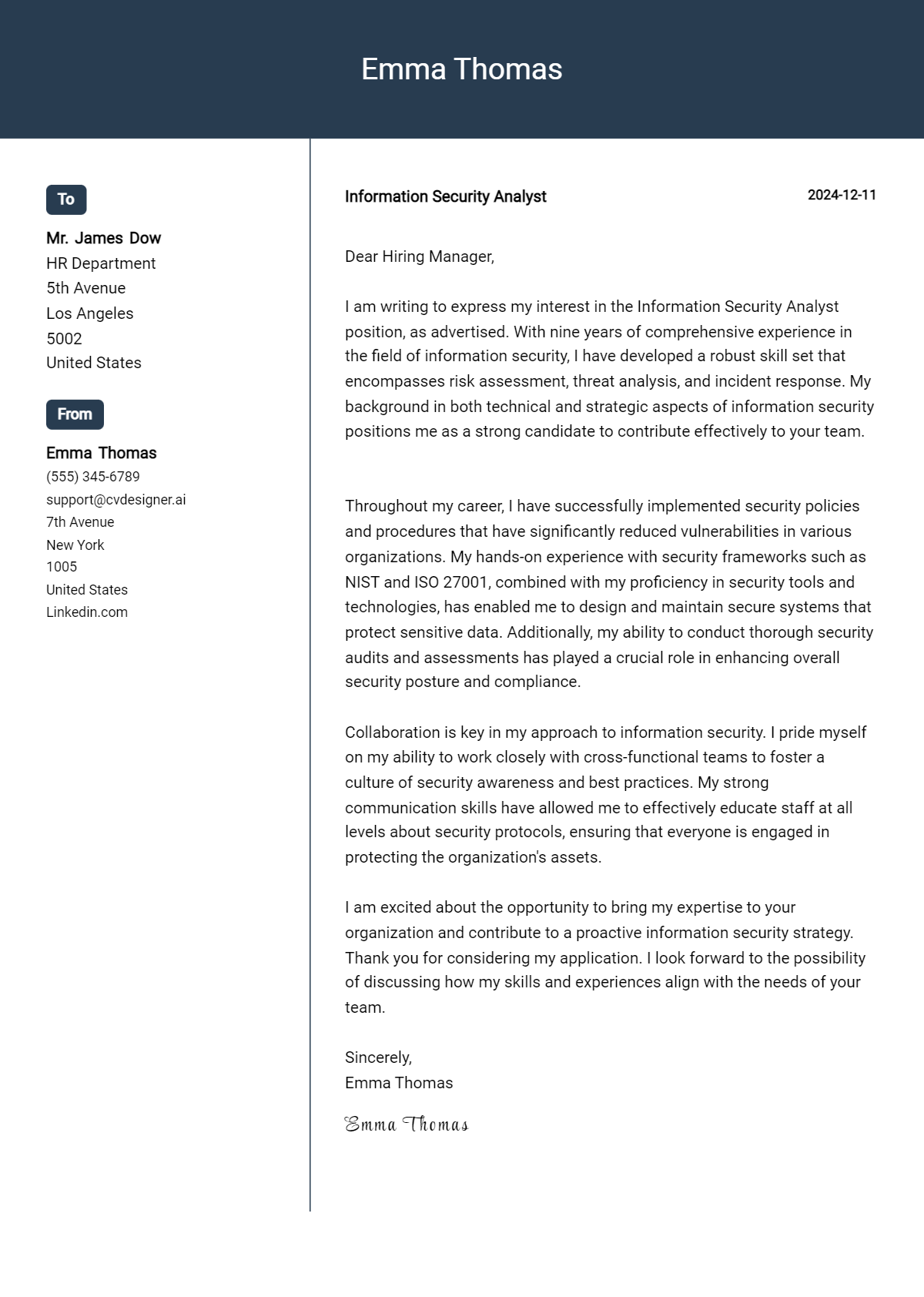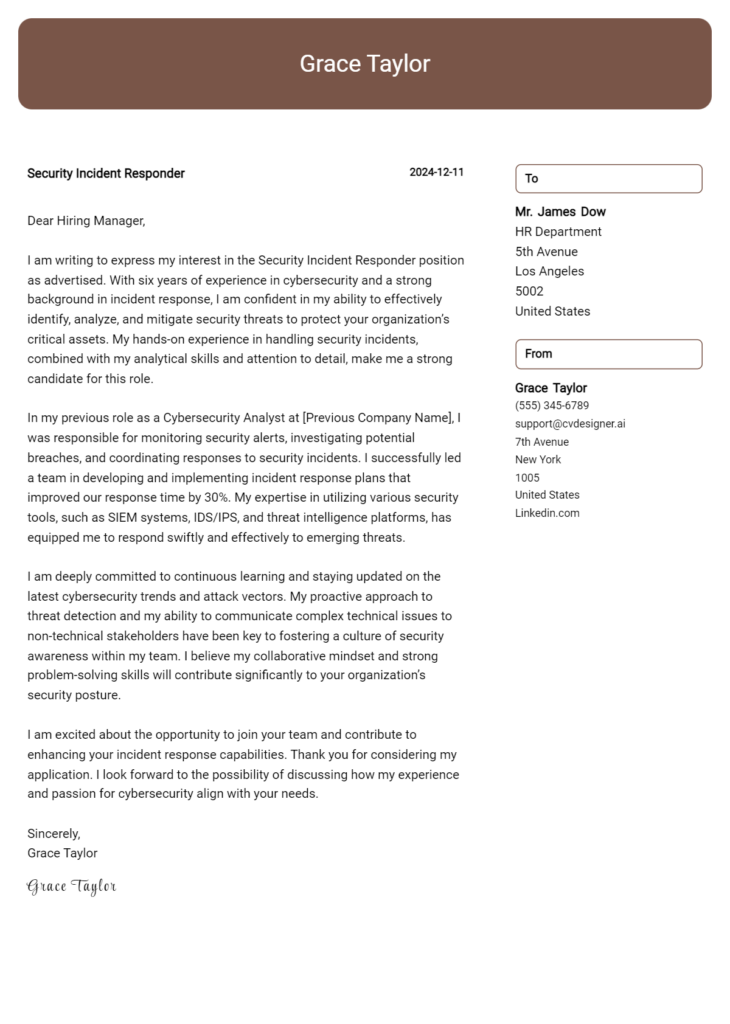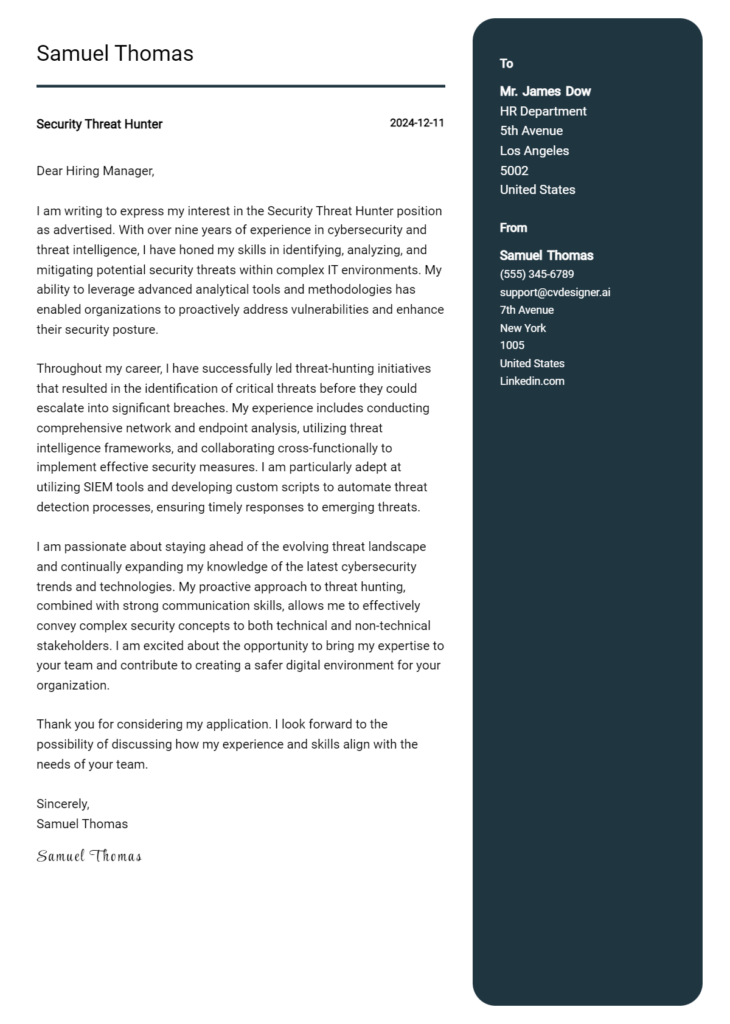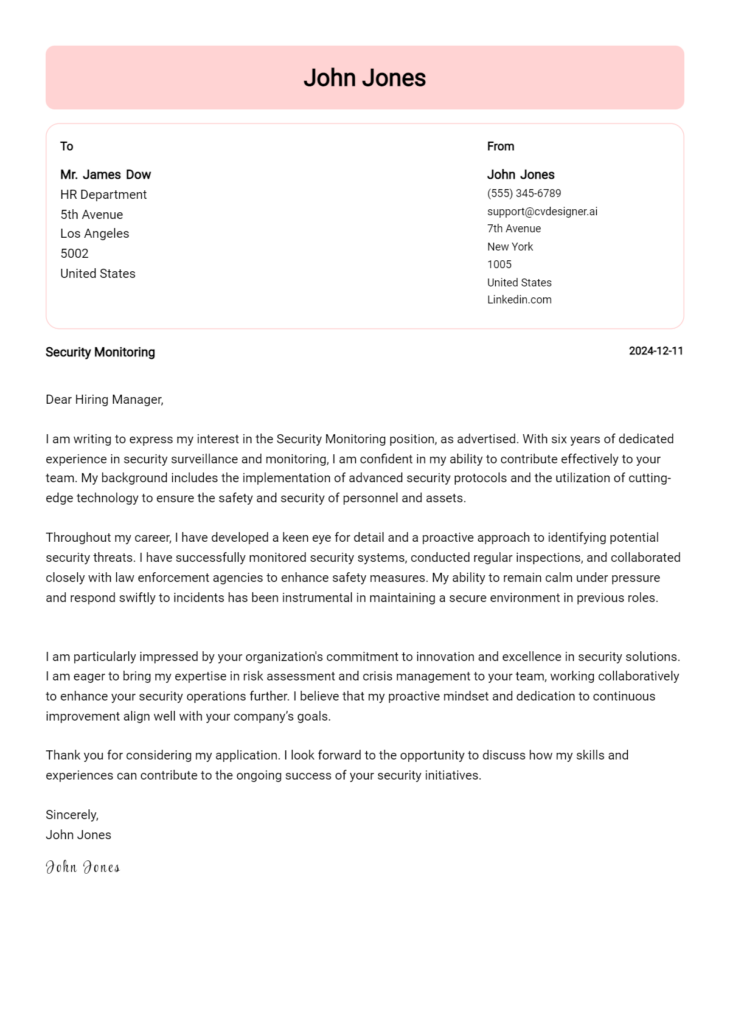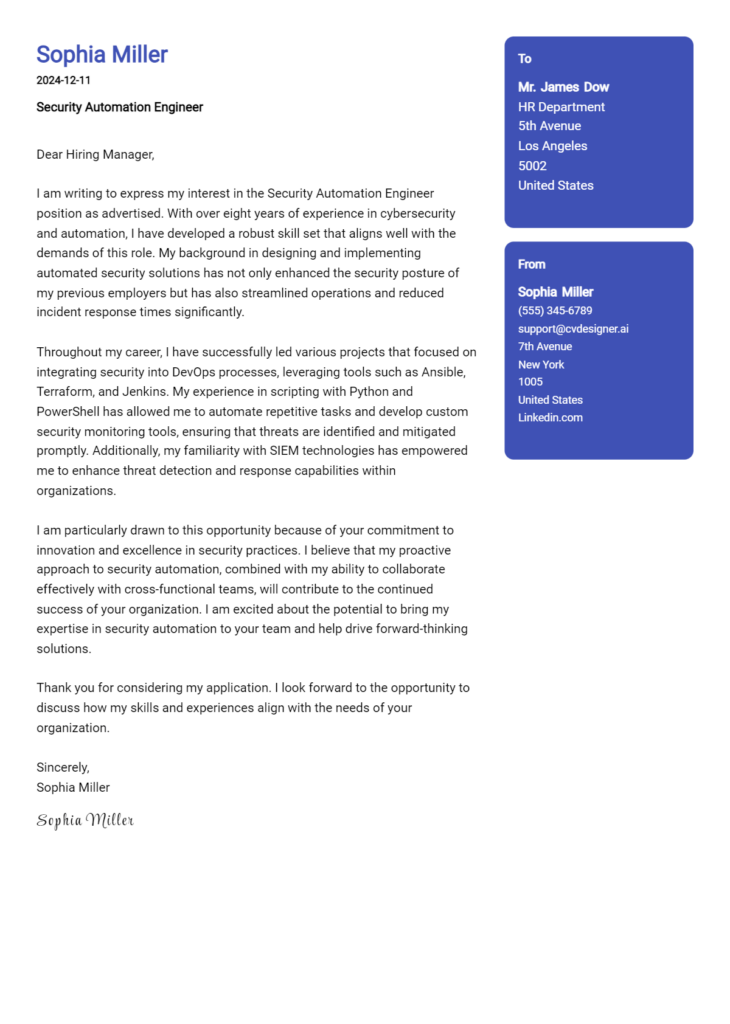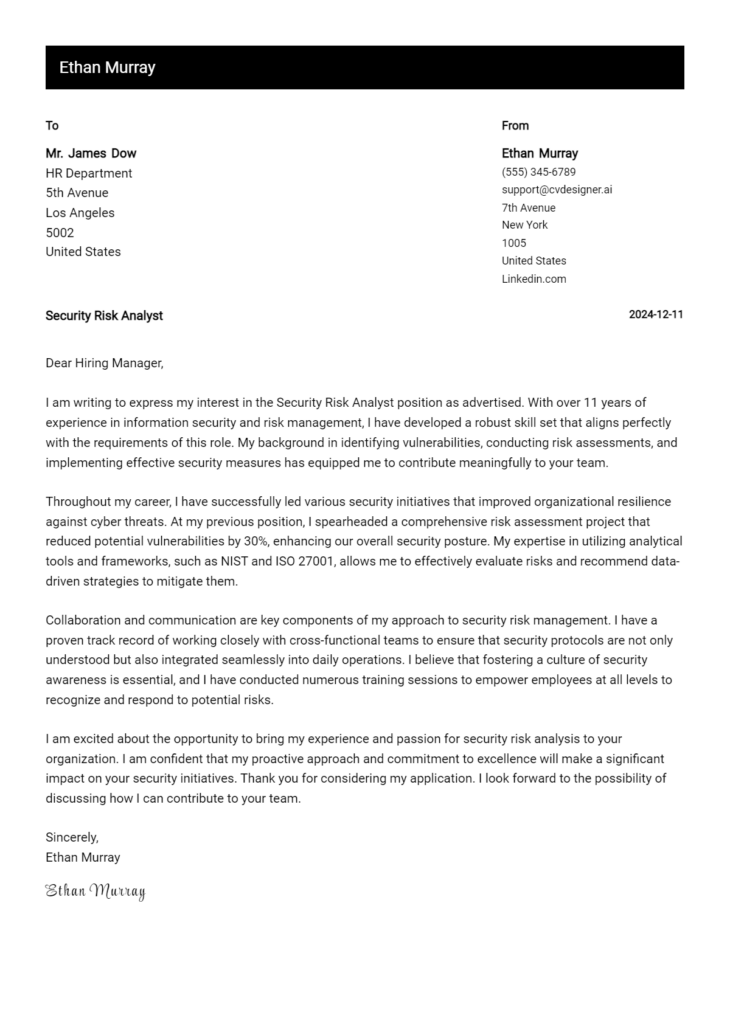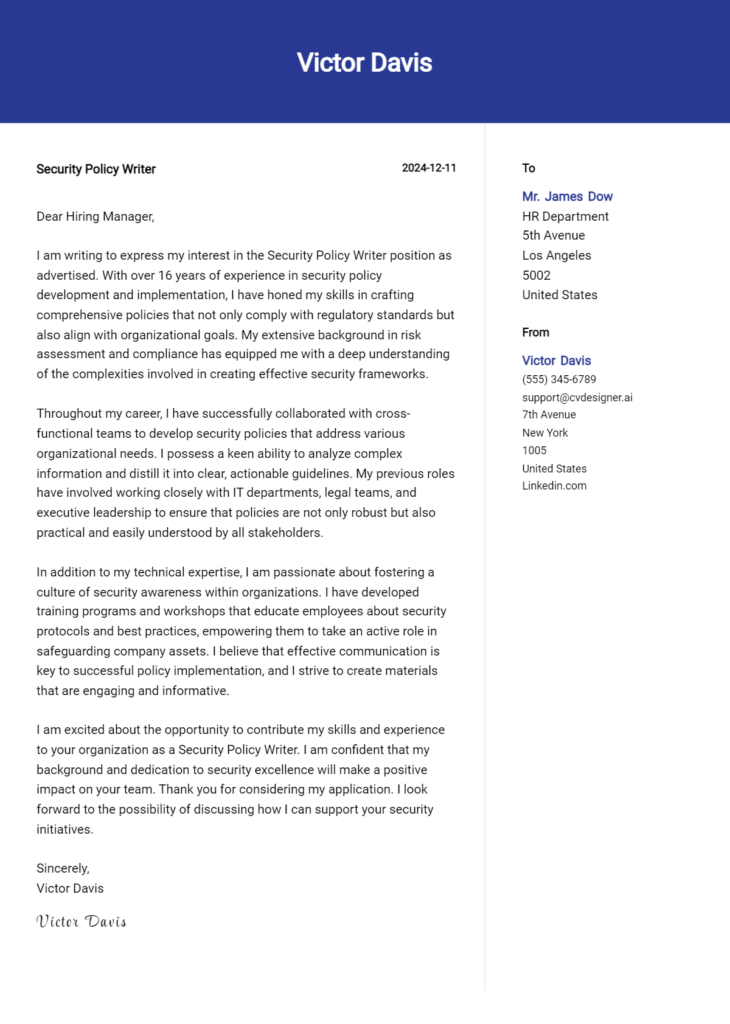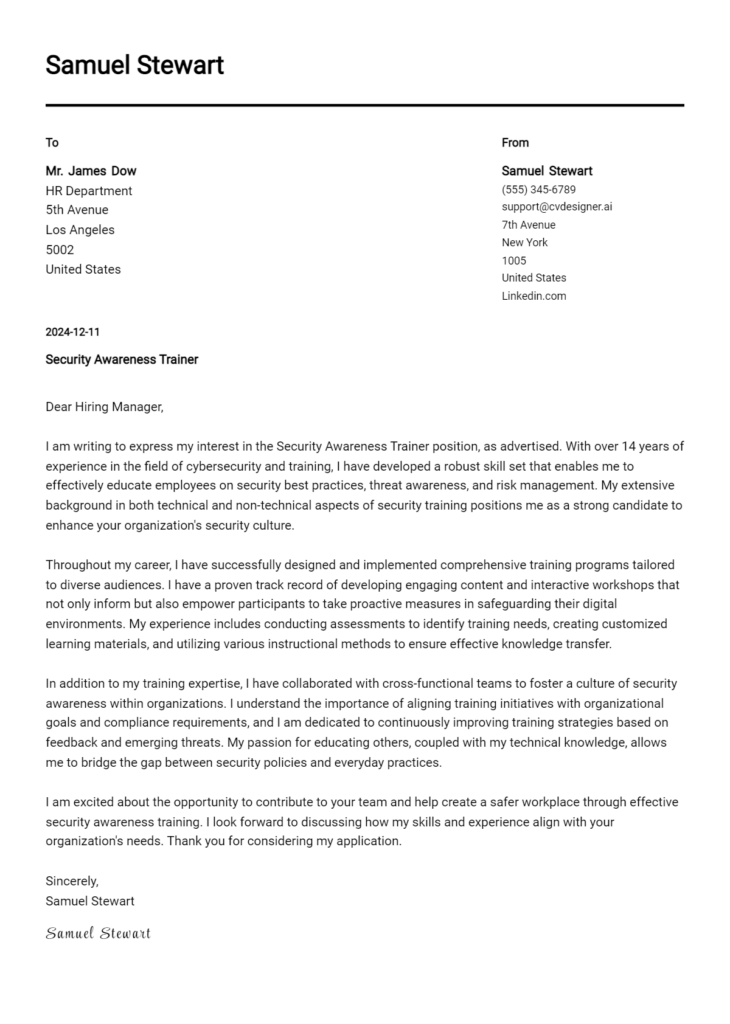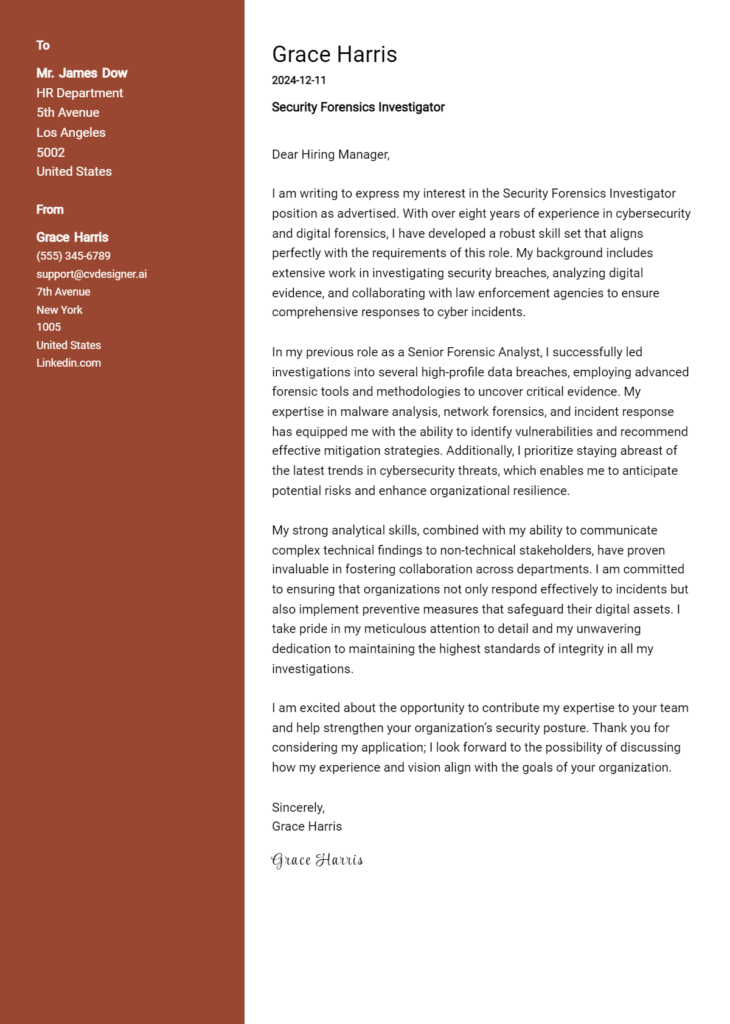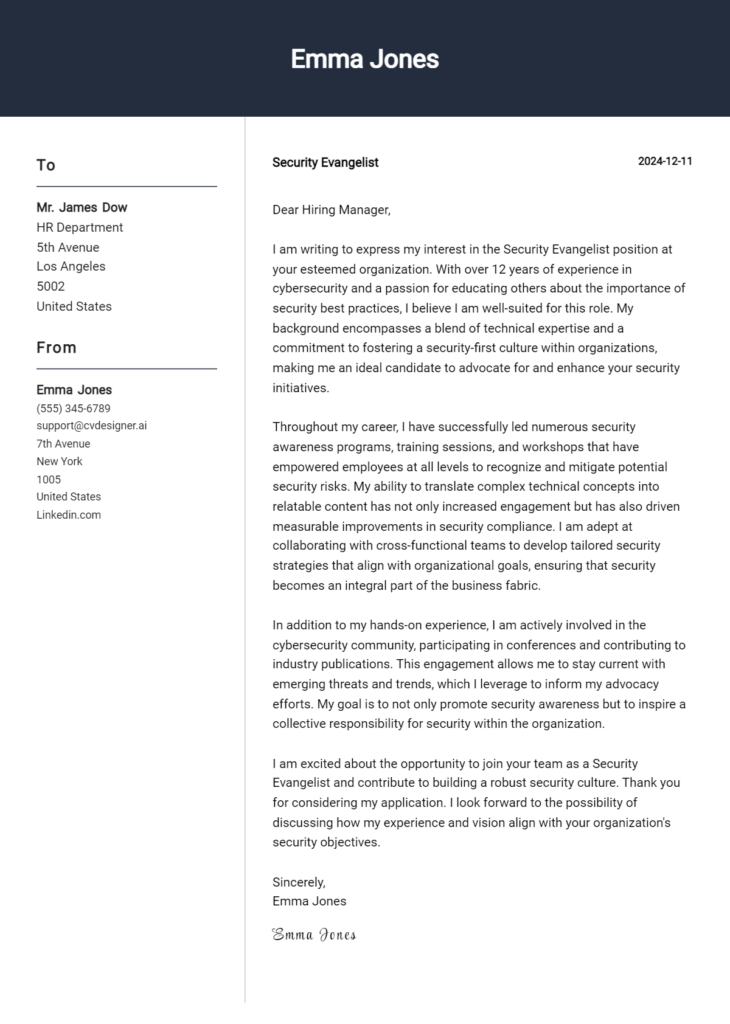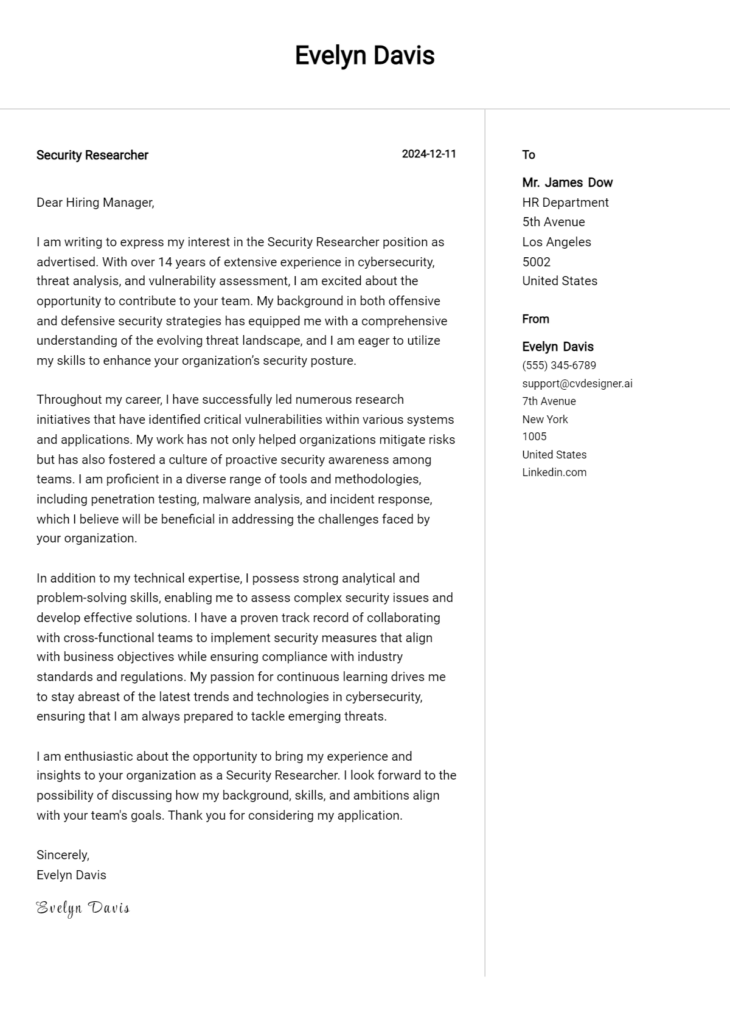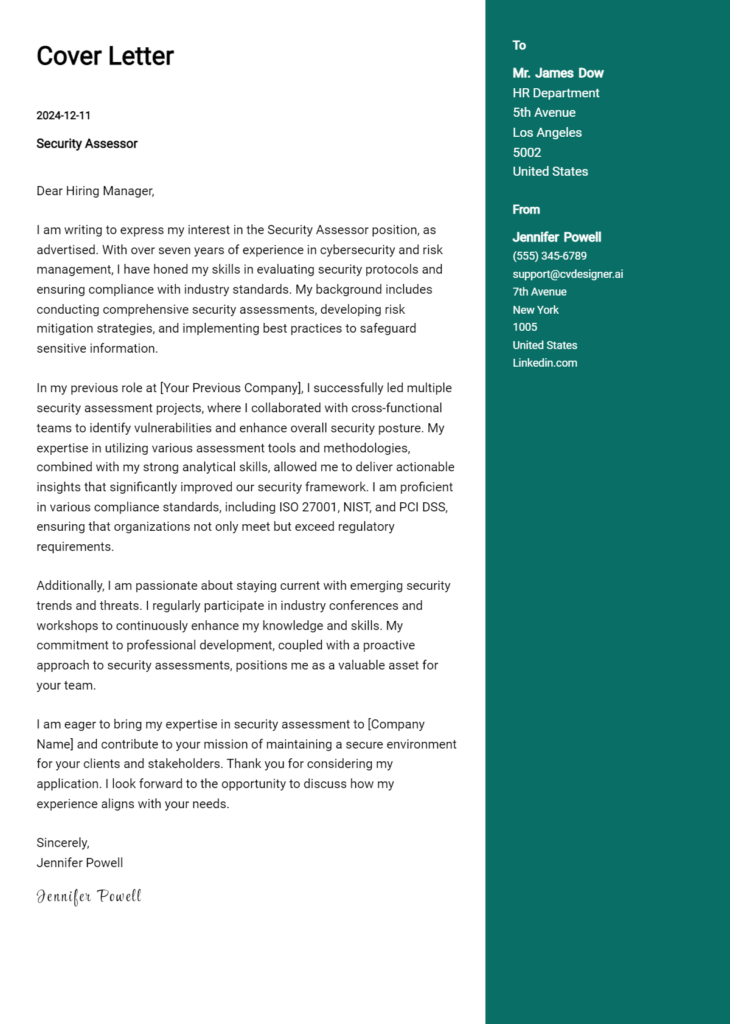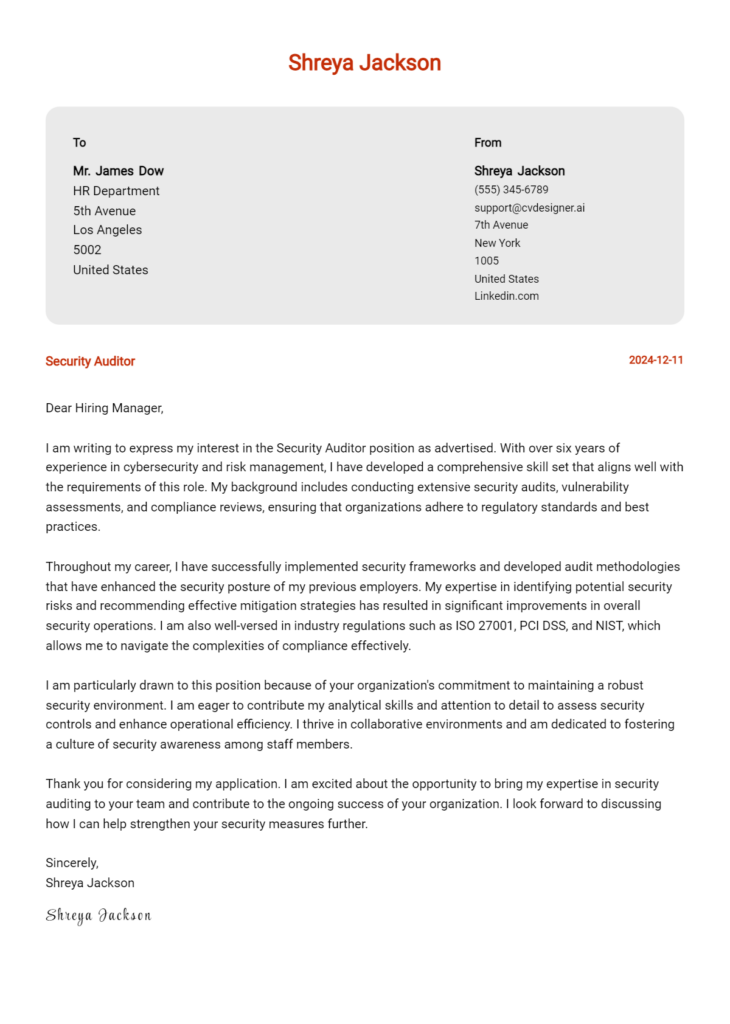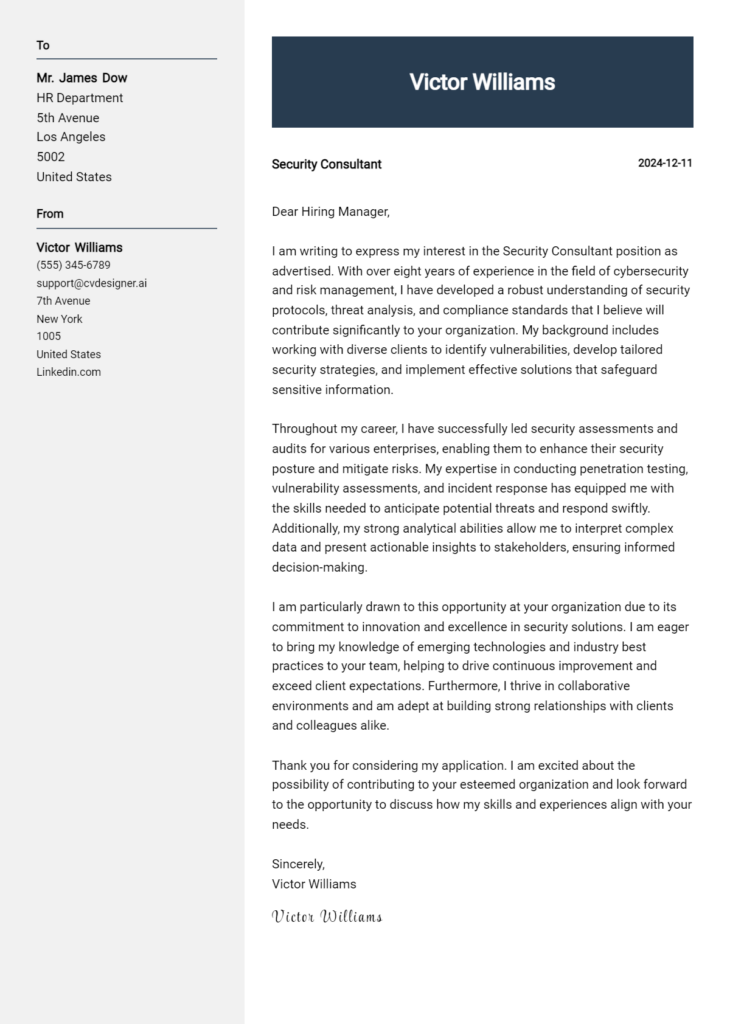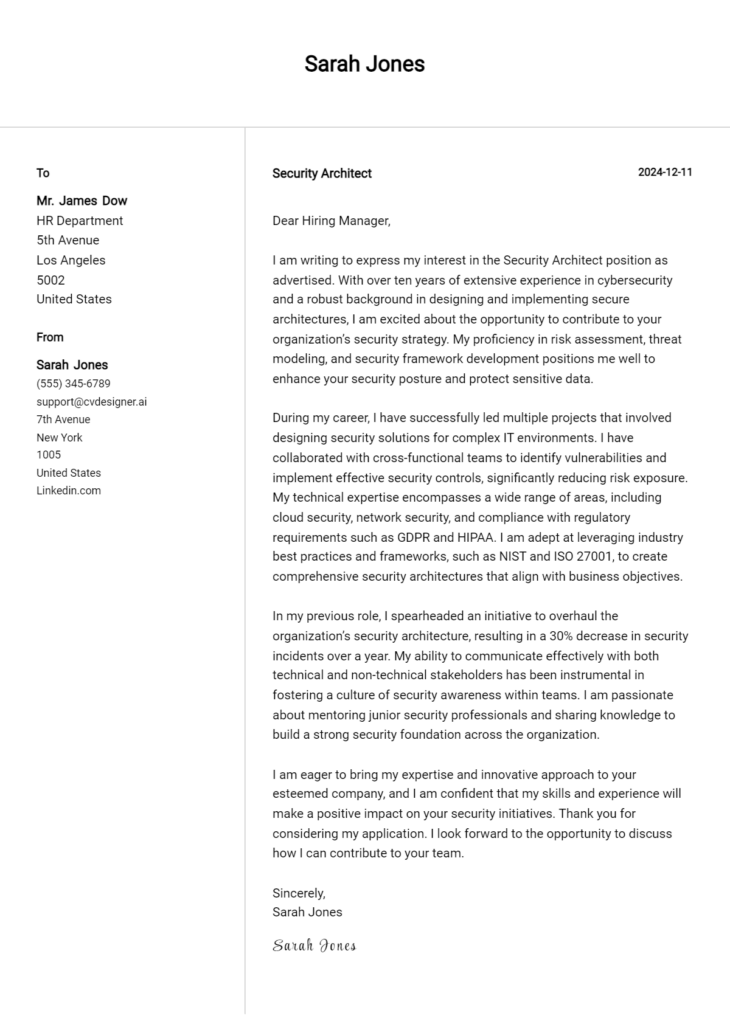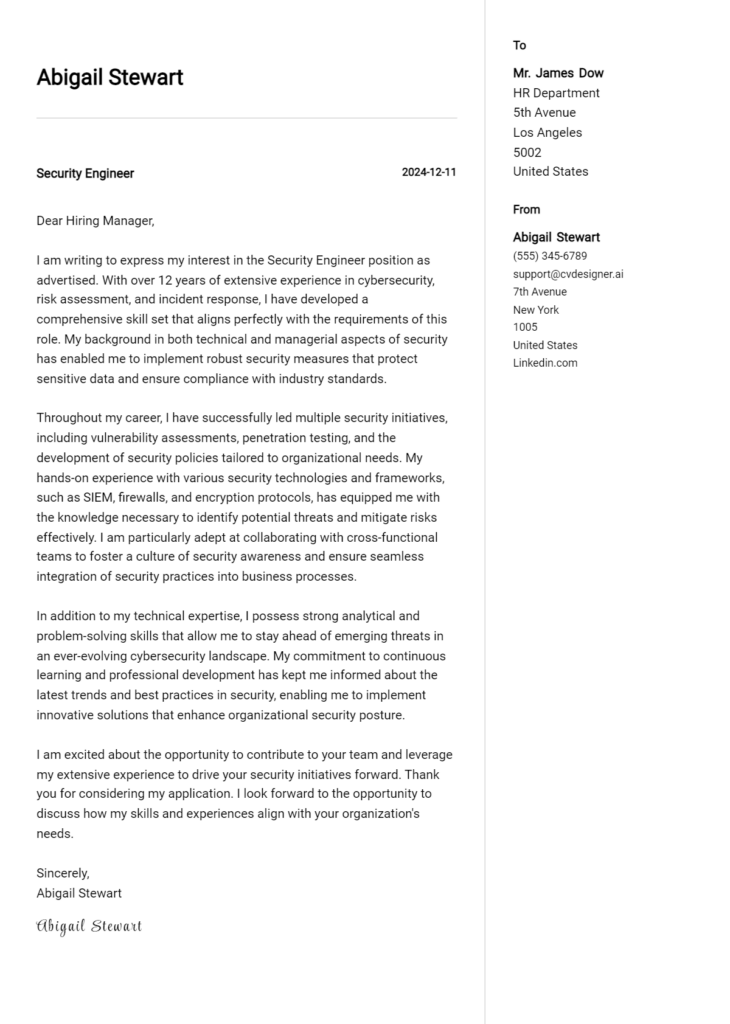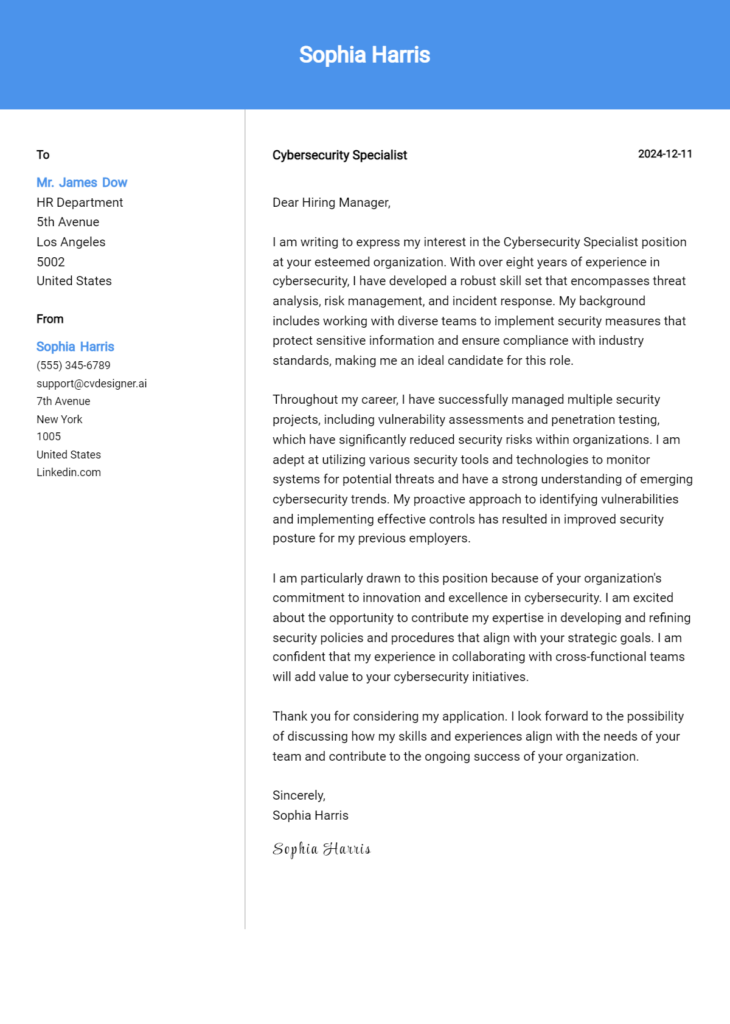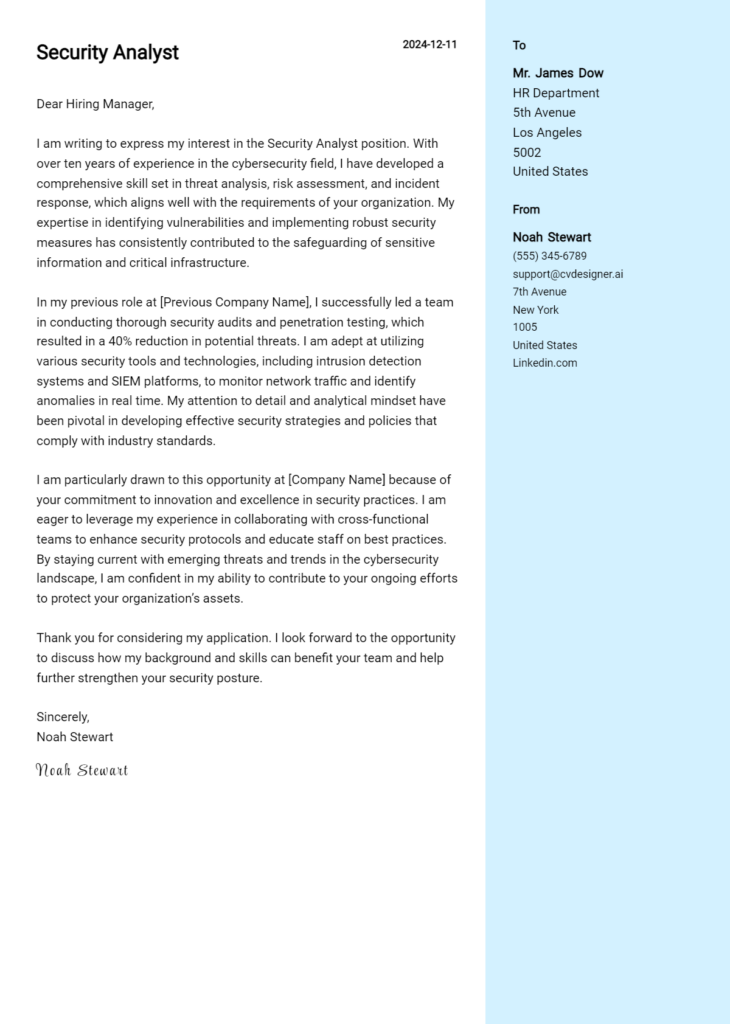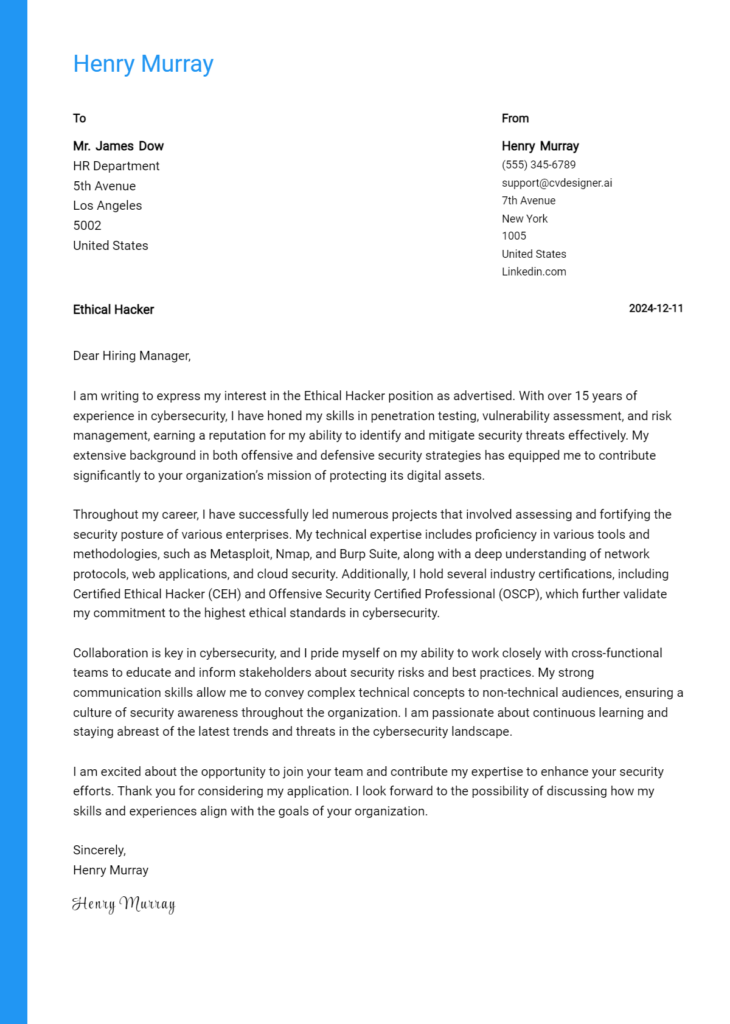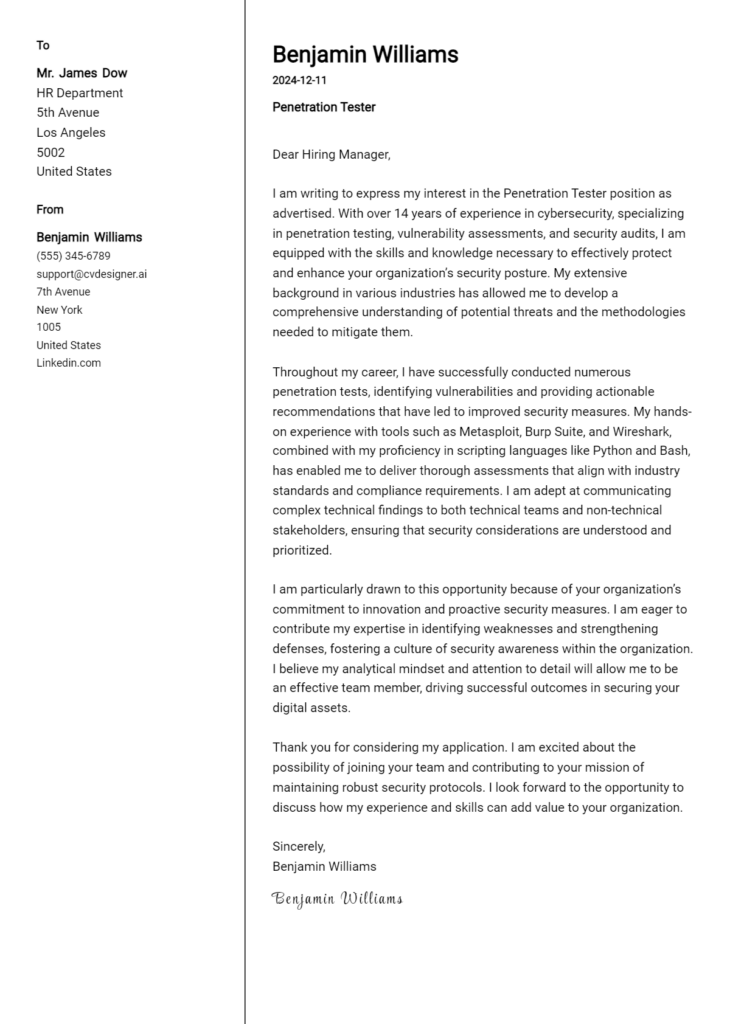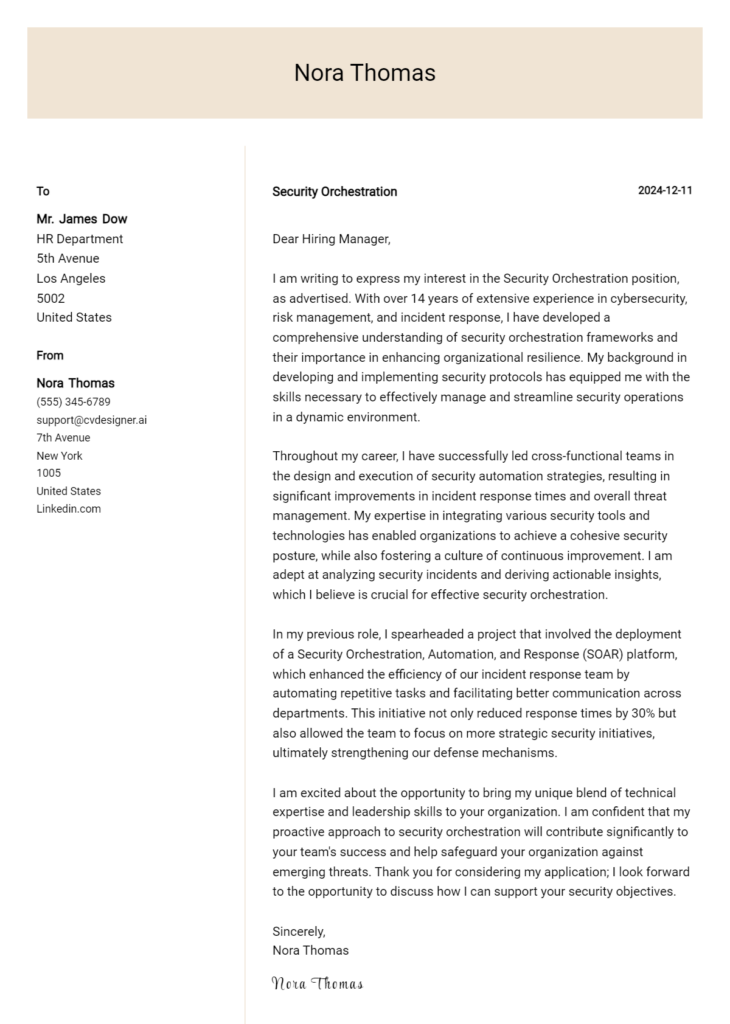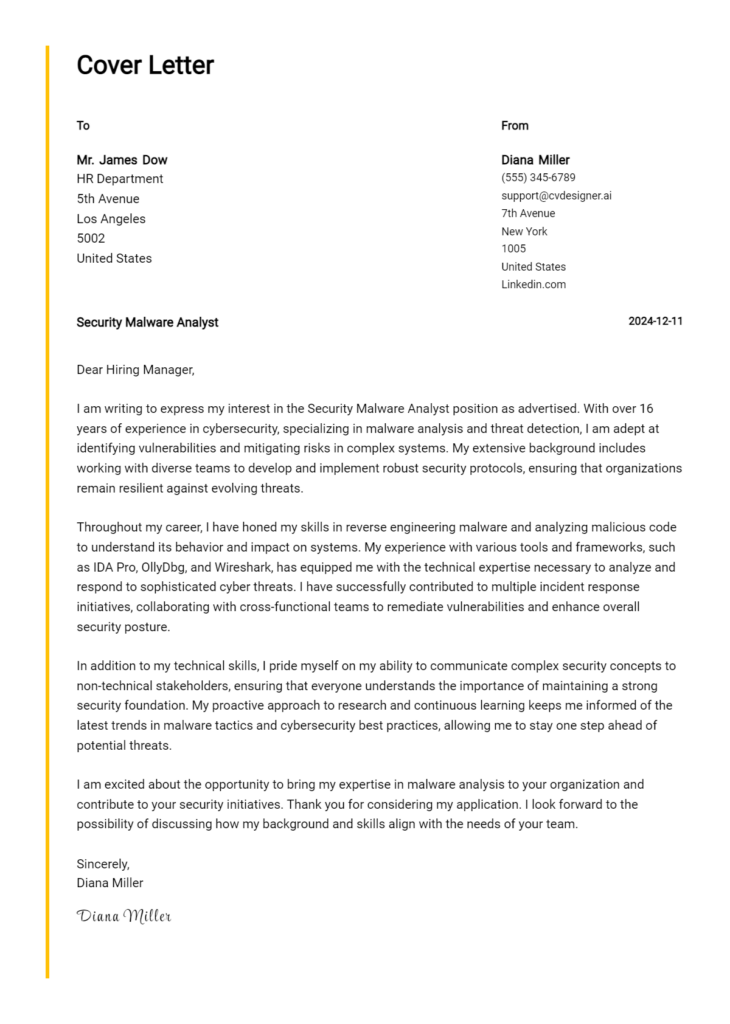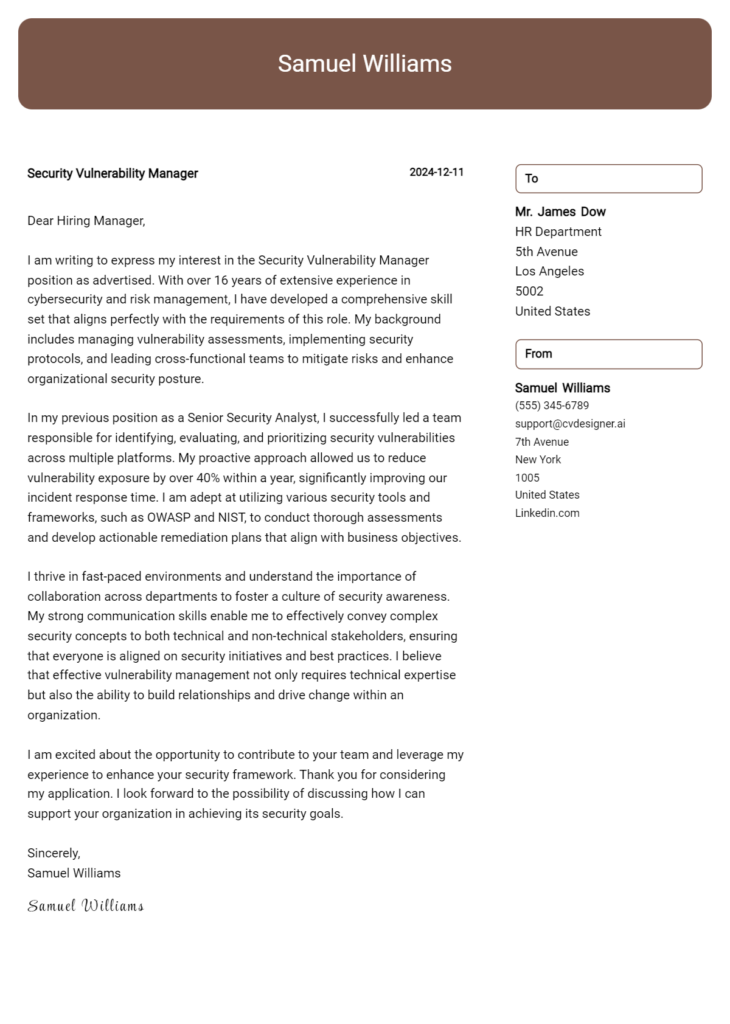Information Security Analyst Cover Letter Examples
Explore additional Information Security Analyst cover letter samples and guides and see what works for your level of experience or role.
How to Format an Information Security Analyst Cover Letter?
Crafting a compelling cover letter is essential for an Information Security Analyst, as it not only showcases your technical expertise but also reflects your ability to communicate complex ideas clearly and effectively. The way you format your cover letter can demonstrate your attention to detail and commitment to security best practices—two critical attributes for anyone in the cybersecurity field. A well-structured cover letter captures the hiring manager's interest and sets the stage for a deeper look at your qualifications.
In this guide, we'll explore how to properly structure your cover letter, providing insights and examples tailored specifically for Information Security Analysts.
We'll focus on the essential components of a professional cover letter, including:
- Cover Letter Header
- Cover Letter Greeting
- Cover Letter Introduction
- Cover Letter Body
- Cover Letter Closing
Each section plays a crucial role in emphasizing your qualifications and professionalism. Let’s delve into the specifics of making your Information Security Analyst cover letter stand out.
Importance of the Cover Letter Header for an Information Security Analyst
The header of your cover letter is a crucial component that sets the tone for your application as an Information Security Analyst. It serves as the first impression for potential employers and should convey clarity and professionalism. A well-structured header includes your contact information, the date, and the recipient's details, ensuring that your application is easily identifiable and accessible. This attention to detail reflects your organizational skills and commitment to security—qualities that are vital in the information security field.
To illustrate the difference between effective and ineffective headers, consider the following examples:
Strong Example
John Doe 123 Security Lane Cyber City, CA 90210 (555) 123-4567 johndoe@email.com October 1, 2023 Jane Smith Hiring Manager SecureTech Solutions 456 Protection Ave Defense Town, CA 90320
Weak Example
johndoe@email.com 10/1/23 To Whom It May Concern,
In the strong example, all necessary information is presented in a clear and professional manner, while the weak example lacks important details and proper formatting, potentially undermining the candidate's credibility.
The Importance of a Cover Letter Greeting for an Information Security Analyst
The greeting of your cover letter is crucial as it sets the tone for the rest of your application. A well-crafted greeting not only demonstrates your professionalism but also adds a personal touch by addressing the hiring manager directly. This can create a positive first impression and engage the reader right from the start. To avoid sounding generic, it’s essential to research and find the recipient's name whenever possible. A tailored greeting shows that you have taken the time to understand the company and its culture, which can make you a more appealing candidate.
When crafting your greeting, steer clear of vague salutations such as "To Whom It May Concern." Instead, aim for a specific name or title. Here are some strong and weak examples to illustrate this point:
Strong Greeting Example
Dear Ms. Johnson,
Weak Greeting Example
To Whom It May Concern,
The Importance of a Strong Cover Letter Introduction for an Information Security Analyst
A well-crafted cover letter introduction is crucial for an Information Security Analyst, as it sets the tone for the entire application. This opening paragraph should not only capture the hiring manager's attention but also succinctly express the candidate's enthusiasm for the role. Moreover, it provides an opportunity to highlight key skills or notable achievements that align with the job requirements. A strong introduction creates an immediate connection, demonstrating that the candidate is both qualified and genuinely interested in contributing to the organization's security posture. Below are examples of strong and weak cover letter introductions to illustrate this point.
Strong Example
Dear [Hiring Manager's Name], As a dedicated Information Security Analyst with over five years of experience safeguarding sensitive data and developing robust security protocols, I am excited to apply for the Information Security Analyst position at [Company Name]. My proven track record in identifying vulnerabilities and implementing effective solutions has not only fortified my previous employers against cyber threats but has also earned me recognition as a leader in the field. I am particularly drawn to [Company Name] because of your commitment to innovative security practices, and I am eager to bring my expertise in risk assessment and incident response to your esteemed team.
Weak Example
To Whom It May Concern, I am writing to apply for the Information Security Analyst position. I have a degree in computer science and have taken a few classes on cybersecurity. I think I would be a good fit for this job, and I hope you consider my application.
Purpose of the Cover Letter Body for Information Security Analyst
The body of a cover letter for an Information Security Analyst plays a critical role in presenting the candidate's relevant skills, experiences, and the unique value they can bring to the organization. This section allows the applicant to elaborate on their technical expertise, certifications, and hands-on experiences with security protocols, risk assessments, and incident response strategies. By highlighting specific projects or accomplishments, such as successfully implementing a new firewall system or leading a team during a security breach, candidates can demonstrate their proficiency and readiness to tackle challenges in the field. A well-crafted cover letter body not only showcases qualifications but also reflects the candidate's commitment to enhancing the organization's security posture.
Strong Example
Dear Hiring Manager, In my previous role as a Security Analyst at XYZ Corp, I led a comprehensive risk assessment project that identified vulnerabilities within our network infrastructure, resulting in a 30% reduction in security incidents over the following year. I successfully implemented a multi-factor authentication system that strengthened user access security and was instrumental in training staff on cybersecurity awareness, which significantly improved our overall security culture. My experience with incident response and my certifications in CISSP and CEH equip me with the knowledge necessary to protect sensitive information and respond swiftly to potential threats, making me a valuable addition to your team. Sincerely, [Your Name]
Weak Example
Dear Hiring Manager, I am interested in the Information Security Analyst position. I have some experience in security and I know about firewalls and antivirus software. I believe I would be a good fit for your company. I have worked with computers for a long time and I am willing to learn more about security. Best, [Your Name]
Importance of the Cover Letter Closing for an Information Security Analyst
The closing of a cover letter is a crucial component, especially for an Information Security Analyst, as it serves to summarize your qualifications, reiterate your enthusiasm for the position, and encourage the hiring manager to take the next steps, such as reviewing your resume or scheduling an interview. A strong closing leaves a lasting impression, emphasizing your fit for the role and your proactive attitude, while a weak closing can undermine the entire message and diminish your chances of standing out.
Strong Example
Thank you for considering my application for the Information Security Analyst position. With my extensive experience in threat assessment, incident response, and maintaining regulatory compliance, I am excited about the opportunity to contribute to your team. I believe my proactive approach to securing information systems aligns well with your organization's mission. I look forward to discussing how my skills and experiences can help enhance your security initiatives. Please feel free to review my resume for more details, and I hope to schedule an interview soon.
Weak Example
Thanks for reading my letter. I hope you think I'm a good fit for the Information Security job. I guess we can talk more about it later. My resume is attached.
These tips will help candidates craft an effective cover letter for an Information Security Analyst position. A well-written cover letter is crucial in showcasing your technical skills, problem-solving abilities, knowledge of the Software Development Life Cycle (SDLC), teamwork capabilities, and passion for continuous learning. These elements are vital in the field of information security, where the landscape is constantly evolving, and the ability to adapt and grow is key to success.
Tips for Writing an Effective Cover Letter
Highlight Relevant Technical Skills: Clearly demonstrate your technical expertise in areas such as network security, penetration testing, and risk assessment. Use specific examples to illustrate how you have applied these skills in previous roles or projects. This not only conveys your competence but also aligns your experience with the requirements of the job.
Showcase Problem-Solving Abilities: Information security often involves troubleshooting complex issues. Share an example of a challenging security problem you faced and describe the steps you took to resolve it. Highlighting your analytical thinking and problem-solving process will show potential employers that you can handle real-world challenges effectively.
Demonstrate SDLC Knowledge: Understanding the Software Development Life Cycle is essential for an Information Security Analyst. Discuss your experience with integrating security practices within each phase of the SDLC. This could include conducting security reviews during the design phase or implementing testing protocols in the deployment phase, showcasing your holistic understanding of security in software development.
Emphasize Teamwork and Collaboration: Security is often a team effort, requiring collaboration with other IT professionals. Provide examples of how you have worked effectively within a team to enhance security measures or respond to incidents. Highlight your communication skills and ability to collaborate, as these are critical in building a strong security posture.
Express a Passion for Continuous Learning: The field of information security is dynamic, with new threats and technologies emerging regularly. Convey your commitment to staying updated with the latest trends and advancements in the industry. Mention any relevant certifications, courses, or self-study initiatives you have undertaken, demonstrating your proactive approach to professional development.
By following these tips, you can create a compelling cover letter that effectively showcases your qualifications for an Information Security Analyst role. For more guidance, consider utilizing cover letter templates or a cover letter builder to streamline your writing process.
Common Mistakes to Avoid in an Information Security Analyst Cover Letter
Crafting a compelling cover letter is essential for making a strong impression as an Information Security Analyst. Avoiding common mistakes can significantly enhance your chances of landing an interview. Here are some pitfalls to watch out for:
- Generic Content: Using a one-size-fits-all approach can signal a lack of genuine interest. Tailor your letter to the specific job and company.
- Neglecting Formatting: A poorly formatted letter can be off-putting. Adhere to a professional cover letter format to ensure clarity and readability.
- Focusing on Responsibilities Instead of Achievements: Employers want to know what you’ve accomplished, not just what you did. Highlight specific successes and metrics to showcase your impact.
- Using Jargon Without Explanation: While industry terminology is important, ensure that your language is accessible. Explain complex concepts clearly to demonstrate your expertise without alienating the reader.
- Failing to Proofread: Typos and grammatical errors can undermine your professionalism. Take the time to carefully proofread your letter or ask someone else to review it for you.
- Ignoring the Employer's Needs: Focus on how your skills and experiences align with the company’s specific needs. Research the organization and mention how you can contribute to their goals.
- Lacking a Strong Opening and Closing: An engaging introduction and a compelling conclusion can set the tone for your cover letter. Start with a strong hook and end with a call to action, encouraging the employer to reach out.
For inspiration, consider reviewing cover letter examples that align with the Information Security Analyst role. Avoiding these mistakes will help you craft a polished and persuasive cover letter that stands out.
Cover Letter FAQs for Information Security Analyst
What should I include in my cover letter for an Information Security Analyst position?
In your cover letter, emphasize your relevant skills and experiences that align with the job description. Start with a strong introduction that mentions the position you’re applying for and where you found the job listing. Highlight your technical expertise in areas such as risk assessment, incident response, and compliance with security regulations. Illustrate your problem-solving abilities with specific examples of how you've mitigated security threats or improved security protocols in previous roles. Additionally, mention any certifications you hold, like CISSP or CISM, to reinforce your qualifications. Finally, express your enthusiasm for the company and how your values align with their mission.
How can I demonstrate my technical skills in the cover letter?
To effectively demonstrate your technical skills in your cover letter, use specific, quantifiable achievements from your past experiences. Instead of simply stating that you have experience with firewalls, explain how you configured a firewall that reduced unauthorized access attempts by a certain percentage. Incorporate technical jargon appropriately to showcase your familiarity with industry tools and processes, such as SIEM, intrusion detection systems, or vulnerability scanning. However, ensure that your explanations remain clear and accessible, as hiring managers may not have a deep technical background. Use bullet points to list key skills or accomplishments for easier readability.
Should I tailor my cover letter for each application?
Absolutely! Tailoring your cover letter for each application is crucial in making a strong impression. Research the company’s specific needs, values, and recent projects related to information security. Customize your cover letter by aligning your skills and experiences with the requirements of the role. For example, if the job emphasizes the need for knowledge in cloud security, highlight your experience with cloud security measures or relevant certifications. A tailored cover letter shows that you’ve invested time in understanding the company and demonstrates your genuine interest in the position, which can set you apart from other candidates.
How long should my cover letter be for an Information Security Analyst position?
Your cover letter should ideally be one page in length, typically around 250 to 400 words. This length is sufficient to convey your qualifications without overwhelming the reader. Begin with a concise introduction, followed by 2-3 paragraphs that detail your relevant experiences and skills. Use the final paragraph to reiterate your enthusiasm for the position and express your desire for an interview. Remember to keep your writing clear and focused; avoid unnecessary jargon or overly complex sentences that could dilute your message. A well-structured, concise cover letter demonstrates professionalism and respect for the hiring manager's time.
Build your Cover Letter in minutes
Use an AI-powered cover letter builder and have your letter done in 5 minutes. Just select your template and our software will guide you through the process.

